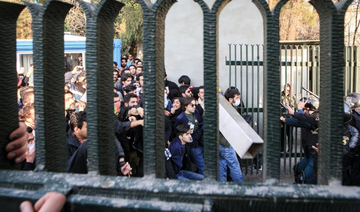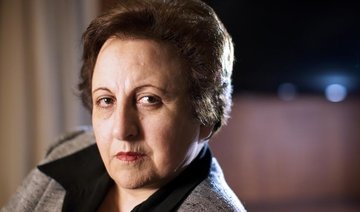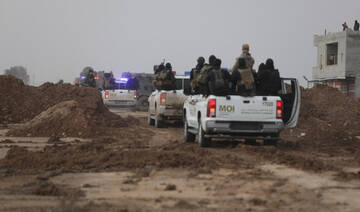TEHRAN: Iran cut access to social media on Sunday in a bid to head off further protests after days of unrest that saw two people killed and dozens arrested.
The interior minister warned protesters will “pay the price” as footage on social media showed thousands marching across the country overnight in the biggest test for the Islamic republic since mass demonstrations in 2009.
The spate of demonstrations began in second city Mashhad on Thursday over high living costs, but quickly spread throughout the country and turned against the system as a whole, with slogans such as “Death to the dictator.”
Lorestan province deputy governor Habibollah Khojastehpour told state television that two people were killed in clashes in the small western town of Dorud late on Saturday, but denied security forces were responsible.
There were no signs of major protests during the day on Sunday, though officials appeared to be bracing for unrest after dark.
In an apparent attempt to stave off more unrest, the authorities began blocking access to photo sharing and online messaging services on mobile phones, including Telegram, which the government accused of being used to foment violence, local media and Telegram’s CEO said.
After an initial silence, state media has begun showing footage of unrest, focusing on young men violently targeting banks and vehicles, an attack on a town hall in Tehran, and images of a man burning the Iranian flag.
“Those who damage public property, disrupt order and break the law must be responsible for their behavior and pay the price,” Interior Minister Abdolrahman Rahmani Fazli said on state television.
“The spreading of violence, fear and terror will definitely be confronted,” he added.
US President Donald Trump said the “big protests” showed people “were getting wise as to how their money and wealth is being stolen and squandered on terrorism.”
“Looks like they will not take it any longer,” he wrote on Twitter, warning that Washington is “watching very closely for human rights violations!“
British Foreign Minister Boris Johnson said he was “watching events in Iran with concern.”
Iranian authorities have sought to distinguish anti-regime protesters from what they see as legitimate economic grievances.
“Do not get excited,” parliament director for international affairs Hossein Amir-Abdollahian wrote in a tweet directed at Trump.
“Sedition, unrest and chaos are different from gatherings and peaceful protests to pursue people’s livelihoods,” he said.
But there have been reminders of the continued support for the regime among conservative sections of society, with pro-regime students holding another day of demonstrations at the University of Tehran on Sunday.
They had outnumbered protesters at the university the day before, although online videos showed significant protests around parts of central Tehran later in the evening.
The total number of arrests from the protests around the country remained unclear.
An official in Arak, around 300 kilometers (190 miles) southwest of Tehran, said 80 people had been detained there overnight.
Police have so far taken a relatively soft approach to the unrest, and there has been no sign that the powerful Revolutionary Guards have yet been deployed.
President Hassan Rouhani has so far not made any statement since the protests started.
He came to power in 2013 promising to mend the economy and ease social tensions, but anger over high living costs and a 12-percent unemployment rate have left many feeling that progress is too slow.
Unemployment is particularly high among young people, who have grown up in a less restrictive environment and are generally considered less deferential to authority.
“Rouhani has run an austerity budget since 2013 with the idea that it’s a tough but necessary pill to swallow to manage inflation and currency problems and try to improve Iran’s attractiveness for investment,” said Esfandyar Batmanghelidj, founder of the Europe-Iran Forum.
“But choosing years of austerity immediately after a very tough period of sanctions is bound to test people’s patience,” he told AFP.
Since the ruthless repression of the 2009 protests against a disputed presidential election that gave hard-liner Mahmoud Ahmadinejad a second term, many middle-class Iranians have abandoned hope of securing change from the streets.
But low-level strikes and demonstrations have continued, with bus drivers, teachers and factory workers protesting against unpaid wages and poor conditions.
Iran cuts social media access as unrest turns deadly
Iran cuts social media access as unrest turns deadly

Syrian authorities bust smuggling ring, tighten border controls

- Smugglers' boat collides with rocks as it attempted to flee pursuing as Coast Guard vessels
- The boat was about to illegally transport passengers from the Syrian coast of Tartus coast to Cyprus
DAMASCUS: Syrian Coast Guard forces have arrested members of a human smuggling network operating in the western town of Tartus, the Syrian Arab News Agency (SANA) reported Saturday.
Authorities pounced on the smugglers as they were about to transport passengers from the Tartus coast to Cyprus by illegal means, the state media said, citing a statement from the General Authority of Ports and Customs.
"The operation resulted in the arrest of all those involved, including the organizers of the trip," said the report, adding that the smugglers' boat attempted to escape as Coast Guard vessels surrounded it, but collided with rocks.
No details were made available on how many suspects were arrested and how many passengers were rescued. Criminal charges are being prepared against the arrested suspects, SANA said.

New restrictions on commercial transit
In a separate move to regulate trade and border security, the ports and customs authority has issued a new policy restricting truck access at land crossings and seaports.
Commercial trucks will now only be permitted entry for loading or unloading upon presentation of an original receipt from the Ministry of Transport’s freight office.
The transfer of cargo between Syrian and non-Syrian vehicles must now take place strictly within designated customs yards at border crossings.
Trucks passing through Syria in transit remain permitted, provided they are under a mandatory customs escort between entry and exit points.














